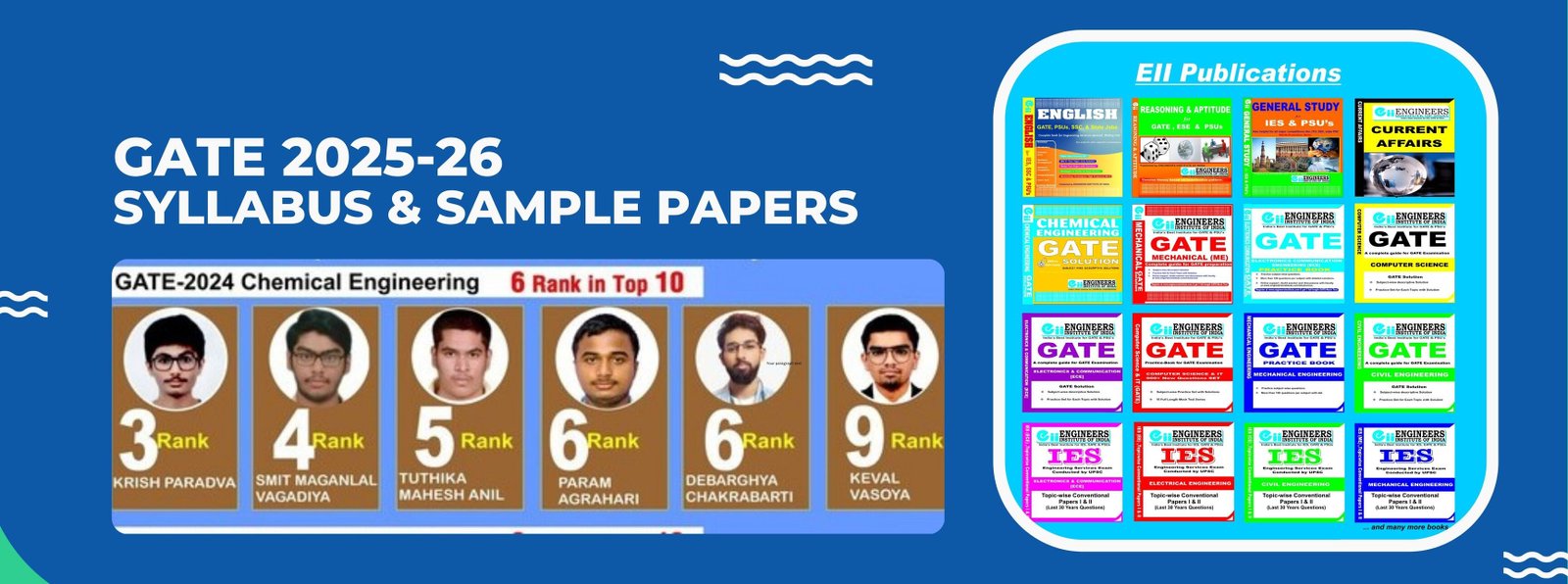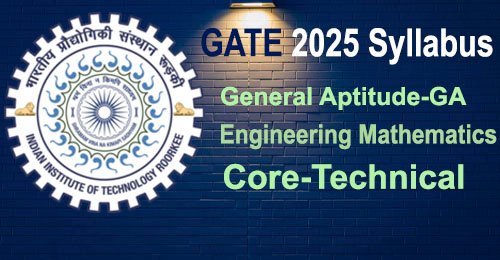GATE 2025 SYLLABUS
GATE 2025-26 will encompass 30 test papers. Below is the list of papers along with their respective codes. Click on the Paper/Code to access the syllabus.
Candidates have the option to appear in either ONE or UP TO TWO test papers. Refer to the Two-Paper Combination page for further information.
The examination papers will be provided in English. Each GATE 2025-26 paper carries a total of 100 marks, with General Aptitude (GA) accounting for 15 marks across all papers. The remaining 85 marks cover the specific syllabus of each respective test paper.
Analyzing the GATE syllabus before starts your preparation is crucial for several reasons:
1. Understanding Scope: The GATE syllabus outlines the topics and subjects that will be covered in the exam. Analyzing it helps in understanding the breadth and depth of the content that needs to be studied.
2. Identifying Strengths and Weaknesses: By going through the syllabus, candidates can identify their strengths and weaknesses in different subjects or topics. This allows them to allocate more time and resources to areas where they need improvement.
3. Strategizing Preparation: Analyzing the syllabus enables candidates to create a structured study plan. They can prioritize topics based on their weightage in the exam and allocate time accordingly. This ensures efficient use of time and resources.
4. Resource Selection: Different topics may require different study materials or resources. Analyzing the syllabus helps in selecting appropriate study materials that cover the entire syllabus comprehensively.
5. Setting Goals: A detailed analysis of the syllabus allows candidates to set realistic goals for their preparation. They can break down the syllabus into smaller, manageable chunks and set milestones to track their progress.
6. Revision Planning: Understanding the syllabus helps in planning effective revision strategies. Candidates can revise topics based on their importance and focus more on areas that are likely to appear frequently in the exam.
7. Reducing Anxiety: Knowing what to expect in the exam reduces anxiety and builds confidence. Candidates feel more prepared and confident when they have a clear understanding of the syllabus and what is expected of them.
In essence, analyzing the GATE syllabus before starting preparations is essential for effective planning, resource allocation, and goal setting, ultimately leading to better performance in the exam.
Check GATE 2025 question paper pattern
COMPUTER BASED TEST : The examination is conducted online at designated centers, where candidates utilize computer desktops equipped with computer mouse for navigation. For Numerical Answer Type (NAT) questions, candidates are required to input their responses as integers or decimal values using virtual keyboard. Additionally, a scientific calculator is provided on the student user interface to facilitate calculations.
| Examination Mode | The test papers will be in English. Computer Based Test (CBT) at various Examination Centres in India |
|---|---|
| Duration | 3 Hours - 180 Minutes |
| Number of Questions | 65 |
| Sections | General Aptitude (GA) + Selected Engineering Subjects |
| Type of Questions |
(a) Multiple Choice Questions (MCQ) One Correct answer out of FOUR Options. 1/3rd NEGATIVE MARKING for WRONG ANSWER. (b) Multiple Select Questions (MSQ) More than ONE Correct answer out of FOUR Options. NO NEGATIVE MARKING for WRONG ANSWER. (c) Numerical Answer Type (NAT) Questions Fixed Integer or Decimal Values as ANSWER. NO NEGATIVE MARKING for WRONG ANSWER. |
| Distribution of Marks in Engineering Papers |
General Aptitude: 15 marks (10 Questions) Engineering Mathematics*: 12-14 marks (4-5 Questions) Engineering Questions: 72-74 marks (50-51 Questions) Total: 100 marks |
| Marking Scheme | Questions carry 1 mark or 2 marks |
| Negative Marking |
For a wrong answer chosen in an MCQ, there will be negative marking. For a 1-mark MCQ, 1/3 mark will be deducted for a wrong answer. For a 2-mark MCQ, 2/3 mark will be deducted for a wrong answer. There is no negative marking for wrong answer(s) to MSQ or NAT questions. There is no partial marking in MSQ |


